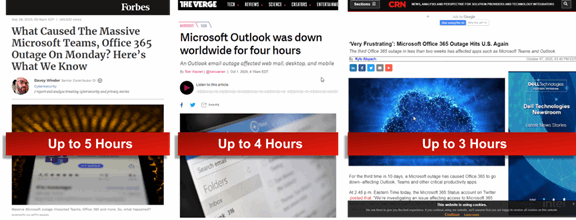In IT, availability and the cost of downtime is top of mind. In fact, it’s a surefire bet that any downtime caused by an unplanned disruption or outage will get the attention of employees and leaders faster than anything else IT is doing at a given time. But aside from the annoyance, when applications fail, it costs organizations money. Especially, with a business-critical application like email, downtime of even a few hours can add up. To reduce downtime and ensure employee productivity is uninterrupted, Fortinet offers email continuity services as part of its FortiMail Cloud SaaS service.
Cloud-based Email Services Can Introduce Unexpected Costs
Gartner estimates that 71% of organizations today are using cloud-based email services.1 Though the reasons for using these services are clear—no underlying hardware or software to maintain, bundled costs and pay for what you use licensing—they can introduce unexpected costs.
For instance, in a three-week period in 2020, Microsoft 365 experienced three separate outages affecting service availability for customers. In March 2021, Microsoft 365 was down for an estimated four-hour period, affecting email and other applications.2 Google Workspace experienced a major global outage in August 2020 and an earlier outage in March 2020.3
1 Gartner, “Market Guide for Email Security,” authors Mark Harris, Peter Firstbrook, Ravisha Chugh, published September 8, 2020.
2 “’Very Frustrating’: Microsoft Office 365 Outage Hits U.S. Again,” CRN – October 7, 2020
3 “Google suffers global outage affecting Gmail and many G Suite services,” ZDNet – August 20, 2020

Both Microsoft 365 and Google Workspace are fantastic communications, productivity, and collaboration suites. However, despite all of the companies’ best efforts to keep these complex applications up and running at all times, accidents and events do happen. It’s for this reason and the associated cost of downtime that organizations do need to evaluate how they might eliminate or mitigate the impact of downtime in their email services.
According to Data Foundry, organizations can estimate the cost of downtime using a straightforward formula:4
Productivity Cost = E x % x C x H
Where E equals the number of employees affected, % equals the percent of their productivity impacted, C equals the average cost of an employee per hour, and H equals the length of the disruption or outage in hours. Using this formula for three different-sized organizations, assuming employees spend 25% of their time engaging in email, and applying a $75,000 average cost for employees, you can see the respective cost of a three-hour outage on productivity.
Take a few minutes to calculate the impact to your own organization from an outage affecting your email services.
Fortinet’s Email Continuity Services Through FortiMail
One proven approach to mitigating the impact of downtime of email services on employee productivity is to utilize an email continuity solution. Email continuity acts as a backup plan for when an outage occurs to reduce the cost down to near zero for organizations.
Email continuity involves maintaining an email store. Now, let’s be clear up front: If you’re relying on Microsoft 365 or Google Workspace for email services, you won’t be able to leverage email continuity services from them. Think of it this way: If you’re Microsoft or Google, do you provide a service that seemingly undermines the notion of always-on availability of your own applications? You’ll need a third-party email security provider like Fortinet.
How email continuity works is pretty simple. When emails come in or are sent out, they are copied into a separate rolling store. In Fortinet’s case, through its email continuity service as part of its FortiMail Cloud SaaS service, this store is for 30 days of email.
4 “How to Calculate the True Cost of Downtime,” Data Foundry – March 17, 2021
Because a separate secure email gateway is in use for email security (regardless of whether your organization uses Microsoft 365, Google Workspace, or hosts Microsoft Exchange Server), that gateway can send messages to the store, which is always maintaining a rolling store of emails. When an outage occurs, the gateway can be operated in server mode, and employees are able to access email services through a separate webmail interface that accesses the email store. The result is that employees can still send and receive emails through the course of the outage. When core email services are restored, the store syncs email, and employees can go back to using their primary email application. And by the way, at no time is the efficacy of your email security reduced or impacted by the outage. One additional benefit of the store is that it gives employees the ability to recover lost emails when they might have deleted them off of their main view.
Fortinet Email Security – Conclusion
Email continuity represents a simple way to eliminate and mitigate the risk and cost associated with unplanned and planned disruptions and outages of your core email services. Though we like to consider that cloud-based services are always-on and available, the truth is that even the best SaaS applications and cloud-based resources do experience disruptions to services from time to time. Email continuity services offer a low-cost mechanism to keep your employees productive with the service often paying for itself several times over after even the first experienced outage.
